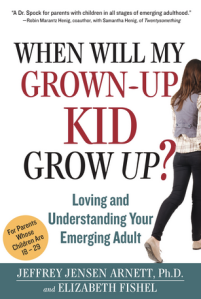Compared to my or my parents' generation, young people today are taking longer to reach adulthood, thanks to the social and economic changes of modern society. They take more time to explore relationships and to educate themselves for the complex information-based economy. Many face unemployment and have to live longer at home--and if they do work, it is not unusual to change jobs many times before they turn 30. Fewer are getting married and if they do, they marry later and have fewer children. Scholar Jeffrey Arnett, of Clark University in Massachusetts, now calls this period from ages 18- to 29-years old, emerging adulthood, a period so unique it deserves to be considered its own distinct phase of the lifespan.

Parenting this age group is also a new ball game. The biggest challenge--since emerging adults are in some ways grown up and in other ways not--is to figure out when to step in and assert parental authority and when to hold back...all the while remaining emotionally connected and respecting their growing autonomy. Arnett teams up with Oakland, CA writer Elizabeth Fishel to interview parents, professionals, and emerging adults, themselves, in order to gather the best advice on just where to find that parenting line... in areas of romance, job-hunting, communication, the Internet, and more.
I reviewed their book, When Will My Grown-Up Kid Grow Up? Loving and Understanding Your Emerging Adult, on the Greater Good Science Center website.
The important news is that our emerging adults still need our continued parenting. Rest assured, it does not mean that something is wrong. In fact when parents step in and help appropriately, their emerging adults do better in the long run--in their psychological well-being, their self-esteem, and even the standard of living they achieve.
We parents can mistake our emerging adults' exploratory meanderings and trial-and-error attempts as floundering, but they feel, even while struggling, that they are thriving and they are confident about their future. They are also, say Arnett and Fishel, the most "generous generation" to come along, giving of their time and talents in far-flung regions.
And happily, the research shows that the majority of emerging adults land safely in adulthood--where they become financially stable, make independent decisions, and take responsibility for themselves.